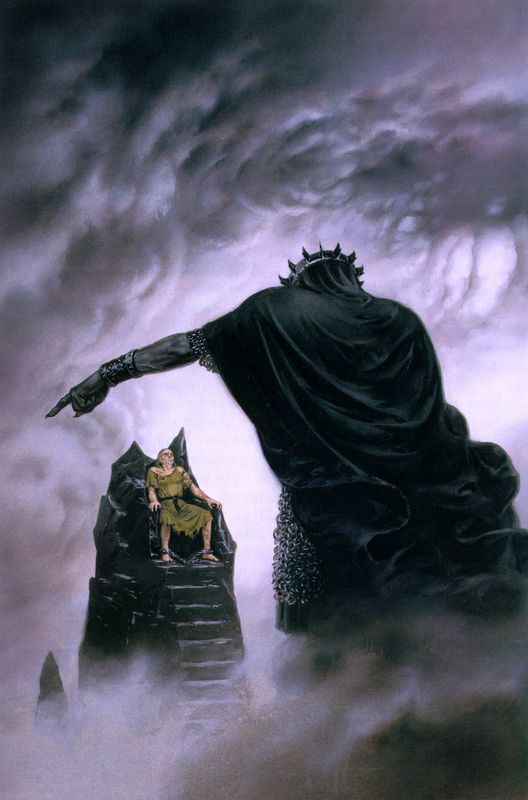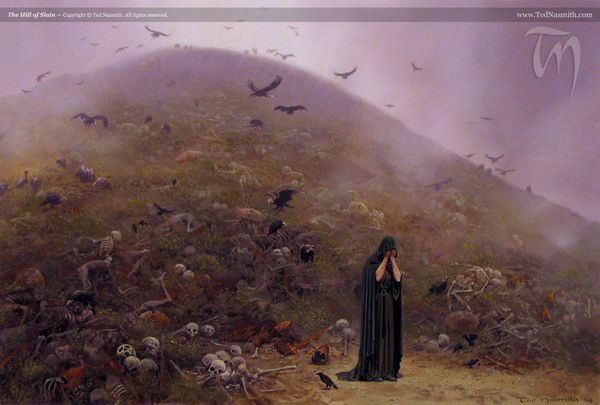The Orcs and the wolves went freely through all the North, and came ever further southward into Beleriand, even as far as Nantathren, the Land of Willows, and the borders of Ossiriand, and none were safe in field or wild. Doriath indeed remained, and the halls of Nargothrond were hidden; but Morgoth gave small heed to them, either because he knew little of them, or because their hour was not yet come in the deep purposes of his malice. Many now fled to the Havens and took refuge behind Círdan's walls, and the mariners passed up and down the coast and harried the enemy with swift landings. But in the next year, ere the winter was come, Morgoth sent great strength over Hithlum and Nevrast, and they came down the rivers Brithon and Nenning and ravaged all the Falas, and besieged the walls of Brithombar and Eglarest. Smiths and miners and makers of fire they brought with them, and they set up great engines; and valiantly though they were resisted they broke the walls at last. Then the Havens were laid in ruin, and the tower of Barad Nimras cast down; and the most part of Círdan's people were slain or enslaved. But some went aboard ship and escaped by sea; and among them was Ereinion Gil-galad, the son of Fingon, whom his father had sent to the Havens after the Dagor Bragollach. This remnant sailed with Círdan south to the Isle of Balar, and they made a refuge for all that could come thither; for they kept a foothold also at the Mouths of Sirion, and there many light and swift ships lay hid in the creeks and waters where the reeds were dense as a forest.
And when Turgon heard of this he sent again his messengers to Sirion's mouths, and besought the aid of Círdan the Shipwright. At the bidding of Turgon Círdan built seven swift ships, and they sailed out into the West; but no tidings of them came ever back to Balar, save of one, and the last. The mariners of that ship toiled long in the sea, and returning at last in despair they foundered in a great storm within sight of the coasts of Middle-earth; but one of them was saved by Ulmo from the wrath of Ossë, and the waves bore him up, and cast him ashore in Nevrast. His name was Voronwë; and he was one of those that Turgon sent forth as messengers from Gondolin.

Now the thought of Morgoth dwelt ever upon Turgon; for Turgon had escaped him, of ail his foes that one whom he most desired to take or to destroy. And that thought troubled him, and marred his victory, for Turgon of the mighty house of Fingolfin was now by right King of all the Noldor; and Morgoth feared and hated the house of Fingolfin, because they had the friendship of Ulmo his foe, and because of the wounds that Fingolfin gave him with his sword. And most of all his kin Morgoth feared Turgon; for of old in Valinor his eye had lighted upon him, and whenever he drew near a shadow had fallen on his spirit, foreboding that in some time that yet lay hidden, from Turgon ruin should come to him.
Therefore Húrin was brought before Morgoth, for Morgoth knew that he had the friendship of the King of Gondolin; but Húrin defied him, and mocked him. Then Morgoth cursed Húrin and Morwen and their offspring, and set a doom upon them of darkness and sorrow; and taking Húrin from prison he set him in a chair of stone upon a high place of Thangorodrim. There he was bound by the power of Morgoth, and Morgoth standing beside him cursed him again; and he said: 'Sit now there; and look out upon the lands where evil and despair shall come upon those whom thou lovest. Thou hast dared to mock me, and to question the power of Melkor, Master of the fates of Arda. Therefore with my eyes thou shalt see, and with my ears thou shalt hear; and never shalt thou move from this place until all is fulfilled unto its bitter end.'
And even so it came to pass; but it is not said that Húrin asked ever of Morgoth either mercy or death, for himself or for any of his kin.
By the command of Morgoth the Orcs with great labour gathered all the bodies of those who had fallen in the great battle, and all their harness and weapons, and piled them in a great mound in the midst of Anfauglith; and it was like a hill that could be seen from afar. Haudh-en-Ndengin the Elves named it, the Hill of Slain, and Haudh-en-Nirnaeth, the Hill of Tears. But grass came there and grew again long and green upon that hill, alone in all the desert that Morgoth made; and no creature of Morgoth trod thereafter upon the earth beneath which the swords of the Eldar and the Edain crumbled into rust.
Chapter 21
Of Túrin Turambar

Rían, daughter of Belegund, was the wife of Huor, son of Galdor; and she was wedded to him two months before he went with Húrin his brother to the Nirnaeth Arnoediad. When no tidings came of her lord she fled into the wild; but she was aided by the Grey-elves of Mithrim, and when her son Tuor was born they fostered him. Then Rían departed from Hithlum, and going to the Haudh-en-Ndengin she laid herself down upon it and died.
Morwen, daughter of Baragund, was the wife of Húrin, Lord of Dor-lómin; and their son was Túrin, who was born in the year that Beren Erchamion came upon Lúthien in the Forest of Neldoreth. A daughter they had also who was called Lalaith, which is Laughter, and she was beloved by Túrin her brother; but when she was three years old there came a pestilence to Hithlum, borne on an evil wind out of Angband, and she died.
Now after the Nirnaeth Arnoediad Morwen abode still in Dor-lómin, for Túrin was but eight years old, and she was again with child. Those days were evil; for the Easterlings that came into Hithlum despised the remnant of the people of Hador, and they oppressed them, and took their lands and their goods, and enslaved their children. But so great was the beauty and majesty of the Lady of Dor-lómin that the Easterlings were afraid, and dared not to lay hands upon her or her household; and they whispered among themselves, saying that she was perilous, and a witch skilled in magic and in league with the Elves. Yet she was now poor and without aid, save that she was succoured secretly by a kinswoman of Húrin named Aerin, whom Brodda, an Easterling, had taken as his wife; and Morwen feared greatly that Túrin would be taken from her and enslaved. Therefore it came into her heart to send him away in secret, and to beg King Thingol to harbour him, for Beren son of Barahir was her father's kinsman, and he had been moreover a friend of Húrin, ere evil befell. Therefore in the autumn of the Year of Lamentation Morwen sent Túrin forth over the mountains with two aged servants, bidding them find entry, if they could, into the kingdom of Doriath. Thus was the fate of Túrin woven, which is fulltold in that lay that is called Narn i Hîn Húrin, the Tale of the Children of Húrin, and is the longest of all the lays that speak of those days. Here that tale is told in brief, for it is woven with the fate of the Silmarils and of the Elves; and it is called the Tale of Grief, for it is sorrowful, and in it are revealed most evil works of Morgoth Bauglir.
In the first beginning of the year Morwen gave birth to her child, the daughter of Húrin; and she named her Nienor, which is Mourning. But Túrin and his companions passing through great perils came at last to the borders of Doriath; and there they were found by Beleg Strongbow, chief of the marchwardens of King Thingol, who led them to Menegroth. Then Thingol received Túrin, and took him even to his own fostering, in honour of Húrin the Steadfast; for Thingol's mood was changed towards the houses of the Elf-friends. Thereafter messengers went north to Hithlum, bidding Morwen leave Dor-lómin and return with them to Doriath; but still she would not leave the house in which she had dwelt with Húrin. And when the Elves departed she sent with them the Dragon-helm of Dor-lómin, greatest of the heirlooms of the house of Hador.